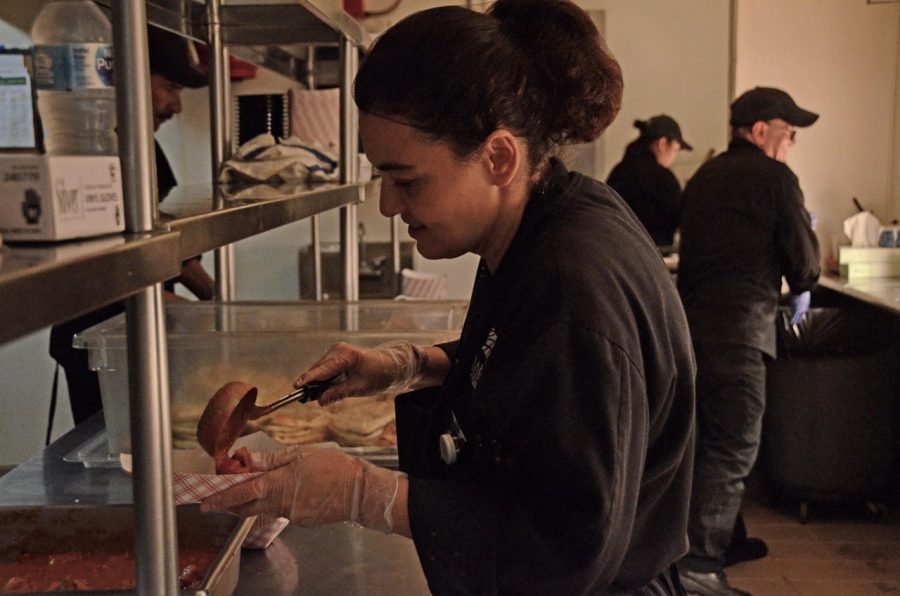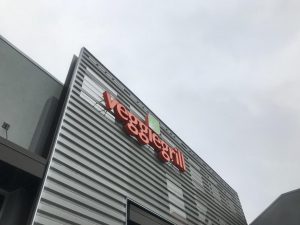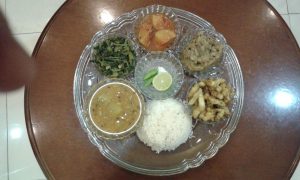Veganism in the lunchroom and beyond
As vegan diet mounts in popularity, vegan meal options accommodate most lifestyles. A kitchen staff member prepares a vegan dish.
September 2, 2018
According to the Collins English Dictionary, a vegan “never eats meat or any animal products such as milk, butter, or cheese.” Though both vegetarians and vegans avoid meat, there is a difference: vegetarians avoid meat and fish but consume other non-meat animal products such as eggs and milk.
Vegans choose this diet for a variety of reasons. Some make the decision out of health concerns. According to the American Dietetic Association, “appropriately planned vegetarian diets, including total vegetarian or vegan diets, are healthful, nutritionally adequate, and may provide health benefits in the prevention and treatment of certain diseases.”
Even those who do not choose veganism out of concern for their health note the benefits of avoiding animal products.
“I’ve never experienced energy deficiency since I’ve gone vegan; actually, my energy levels have gotten a lot better since I became vegan because I’m eating healthier and more nutritious foods. I’m able to get through my day, and I’m able to dance for hours on end,” alumna Anastasia Cheplyansky (’18) said.
Research shows that a vegan diet has other advantages as well. An article in the Permanente Journal, a peer-reviewed journal of medicine sponsored by the National Permanente Medicinal Groups, delves into the health benefits of veganism. The article asserts that plant-based diets can lower one’s blood pressure and cholesterol levels, adding that “physicians should consider recommending a plant based diet to all their patients, especially those with high blood pressure, diabetes, cardiovascular disease, or obesity.”
Transitioning to this diet takes patience. To ease into veganism, some people first eliminate meat from their diet before discontinuing their consumption of other animal products.
“I’m actually vegetarian now, but I’m going vegan really soon,” said Rachel Joslyn, assistant to head chef Steve Martin.
Veganism is not a perfect diet. Doctors and nutritionists underscore veganism’s rigorous nature. The Permanente Journal article cautions that “a healthy, plant-based diet requires planning, reading labels and discipline.”
While veganism narrows the number of sources of essential nutrients, vegans can choose from plenty of foods.
Vegans may eliminate the risk of a deficiency by eating the right plant-based foods. According to an article on the Harvard Health Publishing website, the potassium and magnesium in fruits and vegetables allows more calcium to stay in the body. Nuts, seeds and whole grains provide protein. Soy and walnuts contain omega-3 fatty acids. For B12, vegans must eat either fortified foods such as cereals or take a supplement, as the vitamin is found only in animal products.
Besides nutrition-related obstacles, vegans may also struggle with the limited availability and variety of vegan foods.
“There’s almost always a vegan option in restaurants, especially in California, but sometimes I’ll go to a restaurant and the only vegan option is fries or a really sad salad,” Anastasia said.
There is a variety of places that offer an array of vegan options. Vegan restaurant The Happy Hooligans offers patrons a variety of comfort foods made without animal products.
Grocery stores may also offer a melange of vegan foods.
“Grocery shopping is really easy,” alumna Satchi Thockchom (’18) said. “There’s always Sprouts and Whole Foods; they have a lot of dairy substitutes and meat substitutes.”
Harker’s lunch program is moving to accommodate the vegans in the Harker community.
“We need to label a lot more things as vegan,” head chef Steve Martin said. “We’re [also] going to offer more vegan options and expand on the vegetarian, the vegan, the organic [and] the natural.”
This piece was originally published in the pages of the Winged Post on Aug. 31, 2018.




![LALC Vice President of External Affairs Raeanne Li (11) explains the International Phonetic Alphabet to attendees. "We decided to have more fun topics this year instead of just talking about the same things every year so our older members can also [enjoy],” Raeanne said.](https://harkeraquila.com/wp-content/uploads/2025/10/DSC_4627-1200x795.jpg)


















![“[Building nerf blasters] became this outlet of creativity for me that hasn't been matched by anything else. The process [of] making a build complete to your desire is such a painstakingly difficult process, but I've had to learn from [the skills needed from] soldering to proper painting. There's so many different options for everything, if you think about it, it exists. The best part is [that] if it doesn't exist, you can build it yourself," Ishaan Parate said.](https://harkeraquila.com/wp-content/uploads/2022/08/DSC_8149-900x604.jpg)




![“When I came into high school, I was ready to be a follower. But DECA was a game changer for me. It helped me overcome my fear of public speaking, and it's played such a major role in who I've become today. To be able to successfully lead a chapter of 150 students, an officer team and be one of the upperclassmen I once really admired is something I'm [really] proud of,” Anvitha Tummala ('21) said.](https://harkeraquila.com/wp-content/uploads/2021/07/Screen-Shot-2021-07-25-at-9.50.05-AM-900x594.png)







![“I think getting up in the morning and having a sense of purpose [is exciting]. I think without a certain amount of drive, life is kind of obsolete and mundane, and I think having that every single day is what makes each day unique and kind of makes life exciting,” Neymika Jain (12) said.](https://harkeraquila.com/wp-content/uploads/2017/06/Screen-Shot-2017-06-03-at-4.54.16-PM.png)








![“My slogan is ‘slow feet, don’t eat, and I’m hungry.’ You need to run fast to get where you are–you aren't going to get those championships if you aren't fast,” Angel Cervantes (12) said. “I want to do well in school on my tests and in track and win championships for my team. I live by that, [and] I can do that anywhere: in the classroom or on the field.”](https://harkeraquila.com/wp-content/uploads/2018/06/DSC5146-900x601.jpg)
![“[Volleyball has] taught me how to fall correctly, and another thing it taught is that you don’t have to be the best at something to be good at it. If you just hit the ball in a smart way, then it still scores points and you’re good at it. You could be a background player and still make a much bigger impact on the team than you would think,” Anya Gert (’20) said.](https://harkeraquila.com/wp-content/uploads/2020/06/AnnaGert_JinTuan_HoHPhotoEdited-600x900.jpeg)

![“I'm not nearly there yet, but [my confidence has] definitely been getting better since I was pretty shy and timid coming into Harker my freshman year. I know that there's a lot of people that are really confident in what they do, and I really admire them. Everyone's so driven and that has really pushed me to kind of try to find my own place in high school and be more confident,” Alyssa Huang (’20) said.](https://harkeraquila.com/wp-content/uploads/2020/06/AlyssaHuang_EmilyChen_HoHPhoto-900x749.jpeg)















